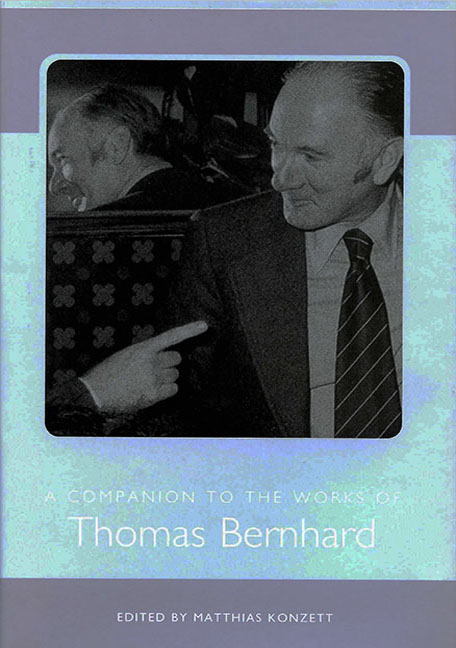Book contents
- Frontmatter
- Contents
- Acknowledgments
- Abbreviations
- Bernhard in the Public
- Bernhard's Poetics
- Homeland, Death, and Otherness in Thomas Bernhard's Early Lyrical Works
- The Broken Window Handle: Thomas Bernhard's Notion of Weltbezug
- Thomas Bernhard's Poetics of Comedy
- Bernhard and Drama
- Bernhard's Social Worlds
- Works Cited
- Notes on the Contributors
- Index
The Broken Window Handle: Thomas Bernhard's Notion of Weltbezug
from Bernhard's Poetics
Published online by Cambridge University Press: 28 April 2017
- Frontmatter
- Contents
- Acknowledgments
- Abbreviations
- Bernhard in the Public
- Bernhard's Poetics
- Homeland, Death, and Otherness in Thomas Bernhard's Early Lyrical Works
- The Broken Window Handle: Thomas Bernhard's Notion of Weltbezug
- Thomas Bernhard's Poetics of Comedy
- Bernhard and Drama
- Bernhard's Social Worlds
- Works Cited
- Notes on the Contributors
- Index
Summary
Some absurdities can make sense; some dusky corners may provide the right setting for illuminating thoughts; and some smoky Kaffeehaus in Vienna's first district can be the venue for strikingly clear insights. These are the sentiments that I continue to associate with the memory of my one and only encounter with Thomas Bernhard, just a few months before he died. Such memories are, of course, in line with one striking aspect of the aftermath of Bernhard's death. Few postwar writers have been subjected to a similarly busy personal-memoir industry like Thomas Bernhard. At times it looked as if the interest in his well-guarded private life became more intrinsic than the discussion of his literary works. But what was, and is, the reason behind this interest?
Much of it seems to originate in the enigma of this writer, who, on the one hand, needed privacy to the point of seclusion, yet on the other hand, was a controversial public figure. One could see him sitting on a bench on Vienna's most traditional grounds for flaneurs, the Graben, the city's commercial center, receiving both devotional greetings from his admirers and at the same time, verbal abuse from outspoken critics. This was a writer who indulged in verbal onslaughts against Austria and the rest of the world. Yet, he clearly enjoyed his public appearances taking his bows on stage with a wry smile in spite of a booing audience. But at the end he even made those whom he despised applaud him. There was an undoubtedly masochistic dimension to Bernhard's love-hate relationship with his fellow Austrians — and vice versa.
Any anecdotal approach to Bernhard hopes to generate a sense of authenticity in what is otherwise an artificial discourse on the distinctly artificial world of his prose and plays. Part of this approach is the ongoing fascination with Bernhard's bewildering generalizations, which were as prominent in his conversations and interviews as in his fiction. Many of these sweeping judgments provided the stuff headlines are made of. “Alles ist grauslich,” this was the very essence of Bernhard's generalizing views. It summed up his notion of a world in which he came to regard contemplating the various ways of committing suicide as the most meaningful way of living.
- Type
- Chapter
- Information
- A Companion to the Works of Thomas Bernhard , pp. 89 - 104Publisher: Boydell & BrewerPrint publication year: 2002

